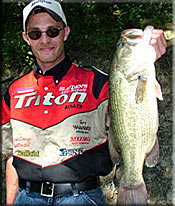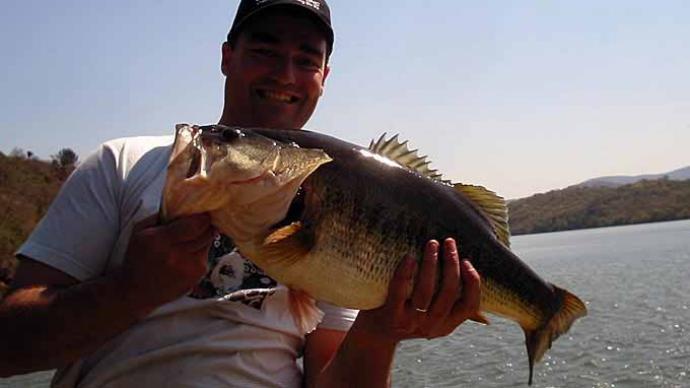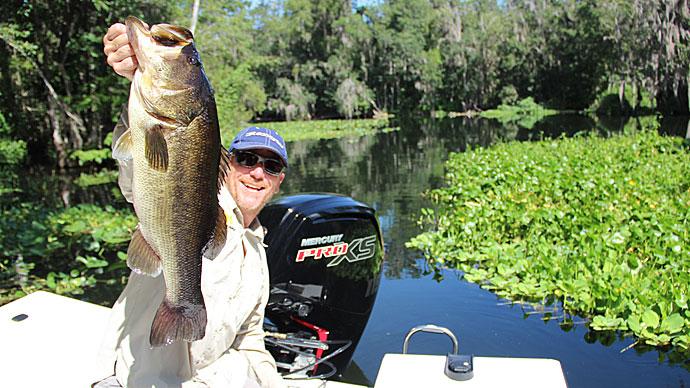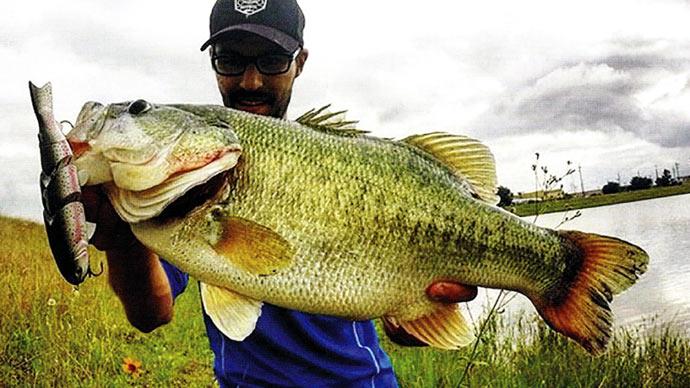
The bait enters the water with laser-like precision. Slowly it descends through the labyrinth of thick cover. Then it happens; you feel a slight tap followed by pressure on the line. You reel down to take up the slack, and "BOOM," an underwater World War III erupts. The feeling I get from catching big bass on a jig is intense. I don't know how such a strange-looking bait can produce big limits time and again. The truth is I don't care as long as it never stops working.
It is no secret that the jig and pig can attract big bass if appropriately used. Your entry needs to be as silent as possible, whether pitching or flipping the bait. Just throwing a jig in the water will produce the same results as tossing a rock in the lake. To keep the noise level to a minimum, you must perfect your skill of keeping the bait at a low trajectory. If you can get the lure to glide two inches above the surface before reaching your target, the likelihood of spooking the fish will be drastically reduced. For some, learning this technique can be a daunting task, but the benefits you receive from your hard work will result in years of great memories.
Once the bait has entered the water as silently as an ancient ninja warrior, you must determine what retrieval technique will trigger the big strikes. It is not uncommon for a bass to crush the bait on the initial drop. Since we do not live in a fairy tale, this is not always the case. Depending on the fish's mood, they may want the bait hopped along the bottom, vertically jigged over branches, swam at various depths, or simply motionless. When I begin the process, I will typically pitch the jig to my target and let it fall to the bottom. If it reaches the bottom without a strike, I let it sit motionless for a few seconds. Then I give my rod tip a few short twitches and pause again. After the second pause, I start my final retrieve. This retrieve will be in a cadence similar to this, hop-hop-pause, hop-hop-hop-pause, hop-hop-pause, etcetera. You may also use a constant hopping retrieve by removing the pauses.
In some areas of the country, bass are obsessed with swimming jigs. This technique is done by retrieving the bait at a speed that will constantly keep it at the desired depth. Adding slow vertical movements to your rod tip during the retrieve will cause the jig to have more of an up and down pattern during its journey through the water. It is vital to remember that no single retrieve will work all of the time. A good angler will use a variety of retrieves until they determine which one bass prefer.
The hook set is another aspect of jig fishing that is crucial. Getting a good, hard, fast hookset serves a couple of purposes. The apparent reason is to drive the hook in deep which takes some power because most jigs have large hooks. Another equally important element is to get the fish out of the cover as quickly as possible. If you give a bass a couple of seconds in thick cover, it will have your line wrapped around everything in sight. My preferred method of setting the hook is simple. I reel down to take up any slack line and set the hook with the power used by another guy named Bagwell swinging for the fences in Houston. This works best for me, and most of the time, getting wrapped around the cover is not an issue. Sometimes the bass will inhale the jig, and you may not even feel it. This is one reason I use a bait enhancer on my jigs 100% of the time. The particular attractant that I use is called MegaStrike. I love it because it stays on my bait for a long time, is not messy to use, and, most importantly, works great. Applying an attractant will increase the time you have to set the hook more often than not. Gaining as little as 4-5 seconds will increase your catch rates regardless of whether you are a pro or a weekend warrior.
Using quality equipment is quite possibly more important when jig fishing than with any other bass fishing technique. The amount of stress put on your equipment is extreme. When flipping and pitching jigs, I use 7'6" AllStar Titanium Flippin' Sticks and 6'10" AllStar Titanium Pitching rods teamed with a Pflueger President baitcasting reel. This combination's extremely tough, lightweight, and well-balanced design makes it an ideal choice when stalking big bass. You can fish through the thick cover all day with a lower level of fatigue.
The main thing I would like to stress is to make sure that you have a stout rod to pull bass out of the thickest cover around. Equally as important as the rod is your line. It is the direct link between you and the bass of your dreams, so do not ignore it. I spool my reels with zero stretch, high abrasion-resistant 50-pound test PowerPro line. The benefits of a zero stretch line are increased sensitivity and more solid hooksets. Not worrying about equipment failure will ease your concerns when pitching a jig into the gnarliest fish-holding cover.
Everyone has heard the old saying, "you can't catch fish if you don't put your bait where they live." Jig fishing makes putting the bait right on the dinner table in front of big hungry bass is a lot easier. Once you have mastered this bait and have built up a high confidence level, you will catch more and bigger fish.
Until next time, Fish Hard, Fish Often and Don't Hate the Player, Hate the Game.




